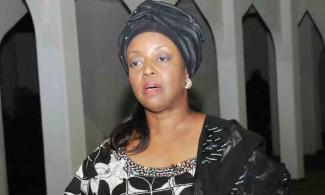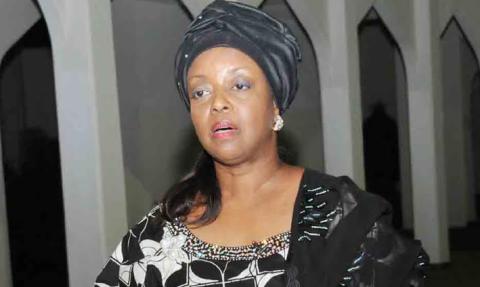
The token N10 drop that the Petroleum Minister, Mrs. Diezani Alison Madueke, announced is unacceptable. In fact, it is just another fraud built on fuzzy math. A N10 drop from N97 a litre to N87 is only 11%. If Nigeria had followed international best practice, the price of petrol should have dropped by at least 30% at the current crude oil price of about $50 a barrel. That means that a litre of petrol in Nigeria should cost about N67 a litre.
On Sunday, January 1, 2012, the Executive Secretary of the Petroleum Product Pricing Regulatory Agency (PPPRA ), Reginald Stanley, released a statement announcing that Premium Motor Spirit (PMS) otherwise called petrol would sell for N141.00 a litre instead of the N65.00 a litre that it sold the day before. That was a N76 a litre increase or 113%.
The agency said that it needed to recoup the N1.3 trillion that Nigeria’s government paid in subsidy to petroleum marketers. The government argued that the landing cost of petrol was N139 a litre. On the day of this change, Brent crude oil sold for $111.12 a barrel.

Nigerians went to the street to protest. The government expected that reaction. In fact, it would be right to say that it was factored into government’s calculation of what subsidy amount to announce to the people.
The government’s calculation was that after the protest they would announce a reduction in price that would calm Nigerians down. And that was exactly what happened.
Even at that, let us for the purpose of this analysis believe that the government, despite its fuzzy mathematics, was truthful in its figures. So after the protests, the government reduced the price of petrol to N97 a litre. That was a N32 a litre increase or 47%. Again, remember that crude was selling at $111.12.
According to OPEC, in 2011, the average price of the Brent was $107.46 a barrel. In 2012 it was $109.45. In 2013 it was $105.87 a barrel.
On October 16, 2014 the price of Brent crude oil fell to $84 a barrel. From that point, it has continued to fall.
According to some calculations done by statisticians and economists using government figures, Nigeria’s subsidy disappeared at the $84.00 a barrel mark. So from October 2014, the price of petroleum products in Nigeria should have been coming down, fuel, kerosene, gas etc. Now that crude is below $50 a barrel, the price of petrol should have dropped by at least 30%. In America, it has dropped by almost 40% in most markets. And the same is true across the world.
So the token N10 drop that the Petroleum Minister, Mrs. Diezani Alison Madueke, announced is unacceptable. In fact, it is just another fraud built on fuzzy math. A N10 drop from N97 a litre to N87 is only 11%. If Nigeria had followed international best practice, the price of petrol should have dropped by at least 30% at the current crude oil price of about $50 a barrel. That means that a litre of petrol in Nigeria should cost about N67 a litre.
Spreading out what should have been a gradual reduction in the price of petrol in the last 6 months, the average customer should have spent N10 less on a litre of petrol in the last six months.
Now here is how the government has been stealing from the pockets of Nigerians. If an average car takes 45.42 litres and you fill your tank twice a week, that's about 91 liters a week. In a month that is 364 litres. If you buy 364 litres of petrol in a month, in 6 months that is 2184 litres. That alone means that Diezani Alison Madueke owes you N21,840.00 refund.
If you spend the same amount on fuel for a generator, i.e. 364 a month, Diezani Madueke owes you another N21,840.00. Put together, an average consumer of petrol in Nigeria has spent a total of N43,680.00 in excess. By the time you add expenditure on gas or kerosene, the total amount that Diezani Madueke owes an average Nigerian will be N50,000.00.
That's exactly what they owe you.
So since October 2014, the government has been stealing from the pockets of all Nigerians who buy petroleum products. Instead of thanking Mrs. Diezani Madueke for the N10 price reduction, Nigerians should demand for N50,000.00 they paid in excess and also insist that the price be dropped to N67 a litre.
This is necessary because when crude oil price recovers, the government will not blink before they jack up the price of petrol. This time, if they have no reelection to face, they may go for their dream price: N141 a litre.
For those who may be tempted to sympathize with the government, the fraud in the oil sector and in the management of that resource is tremendous.
With subsidy removed partially on January 16, 2012, the government realized not the full N1.134 trillion a year it had wanted but more like half of the amount, which would be about N600 billion in 2012. The same would be true for 2013 and 2014, which will bring the total amount that Nigerians paid into the pocket of the government at N600 bn x 3 = N1.8 trillion.
At the same time, the government was constantly budgeting for subsidy to make up the short fall from the partial removal of subsidy. In 2012, the government budgeted N888 billion for that. So the subsidy gap was fully accounted for.
Also, crude oil benchmark used in Nigeria’s budget 2012 was set low at $75 a barrel when the average price of Brent for 2012 was $109.45. In 2013, the benchmark for the budget was $78.00 a barrel when the average price was $105.87 a barrel. In 2014, the benchmark was $77.00 a barrel while the average for Brent crude oil was $99.50. The difference, for a country that produces 2.4 million barrels of oil a day, was in billions of dollars that went into the excess crude account.
That money, as we now know, has been depleted.
Remember that during the subsidy debate some of the sweet talking points of the likes of Ngozi Okonjo-Iweala, Diezani Alison Madueke and Lamido Sanusi were that by the end of 2014, Nigeria would not be importing petroleum products because by then we would have repaired our refineries and new ones would be coming into production. They also argued that the pain would be temporary and that after the pain the benefits would overwhelm Nigerians. They promised urban buses, monthly publication of the amount of money saved, maintenance of the Port Harcourt refinery, construction of eight major roads, two bridges, modern railways etc.
As of today the situation with petroleum production is even worse than it was in 2011. Kaduna and Warri refineries for instance were idle in September of 2014.
Don’t even ask the minister of finance and the coordinating minister of the economy questions. Questions like, how much did the government realize in subsidy removal in the last three years? Where did the estimated N1.8 trillion go? SURE-P? When did the subsidy disappear? When did she stop paying subsidy? How much is Nigeria saving a month since the subsidy disappeared? And where does it go? For our N1.8 trillion, where are the promised urban buses, eight major roads, two bridges and modern railways?
She can point at the ubiquitous SURE-P and a map of a bridge yet to come because they have put in only N10 billion out of the N130 needed, but where is the monthly publication of the money saved from oil subsidy since January 1, 2012?
The government of Goodluck Jonathan is allergic to transparency. That’s why it will not release the $20 billion missing NNPC audit report. The good thing is that any Nigerian who has bought a petroleum product in the last 6 months does not need an audit report to demand a refund from this government.